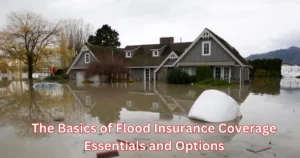A vital economic device for protecting your house or place of job against unexpected losses and failures is belongings insurance. It ensures you can recover financially from a whole lot of dangers, which includes theft, vandalism, and natural catastrophes.
Property Insurance is another function of this kind of coverage that frequently protects you in the event that someone receives harm to your private home. Renters, commercial enterprise proprietors, or owners all want the important piece of thoughts that comes with having assets coverage.
What is Property Insurance?
Property insurance provides financial protection against loss or damage to personal items and real properties. It covers events like fires, thefts, and natural calamities. The cost of replacing or repairing an insured policyholder’s property is reimbursed.
Importance Of Property Insurance
Property insurance is designed to guard against capacity financial losses due to harm or destruction of property. This can result from herbal failures, injuries, robbery, vandalism, and different sudden activities. Here’s why belongings coverage is critical:
1.Financial Protection: Property insurance covers the value of repairing or replacing damaged property, which may be giant. Without insurance, these prices would pop out of your pocket.
2.Peace of Mind: Knowing that your own home is included against unforeseen activities lets you live or perform your business with much less fear about economic setbacks.
3.Mortgage Requirement: For house owners, assets insurance is often a requirement via mortgage creditors. It ensures that their investment (your house) is covered.
4.Liability Coverage: Many belongings insurance regulations include liability insurance, protecting you if a person is injured in your own home and decides to sue.
Property Insurance Types
Based only on the type of property being insured and the coverage it offers, property coverage can be broadly defined. These are the most typical kinds:
1.Homeowners coverage: Private houses are covered by using this kind of insurance. It generally includes liability safety, coverage for private property, and supplementary dwelling expenses in the event that an unexpected occasion renders you temporarily unable to occupy your private house.
2.Renters Insurance: Designed for tenants, renters insurance covers private assets, legal responsibility protection, and extra residing charges. It no longer cowls the constructing itself, as that is the proprietor’s duty.
3.Condo Insurance: This kind of coverage is for apartment owners. It covers private assets, interior partitions, and fixtures, in addition to legal responsibility protection. The condo association’s grasp policy generally covers the constructing and common regions.
4.Landlord Insurance: This insurance is for property proprietors who lease out their houses or flats. It covers the building, legal responsibility protection, and lack of rental income if the property becomes uninhabitable due to a blanketed event.
Benefits of Property Insurance
1.Broad Insurance: Property coverage gives substantial coverage against various dangers, which include burglary, vandalism, natural catastrophes, and fireplaces. To protect your investment, this entire safety is critical.
2.Liability Protection: Many belongings coverage guidelines provide liability safety, that can lower legal fees and damages if someone is injured in your home or if you by chance harm someone else’s property.
3.Additional Living Expenses: If your home becomes uninhabitable due to an included event, belongings insurance can lower the value of transient housing and other additional dwelling charges.
4.Replacement Cost Coverage: Some belongings insurance rules provide replacement fee insurance, which will pay for the fee of replacing broken property without deduction for depreciation.
Limitations and Exclusions
While assets insurance gives substantial safety, it’s far critical to recognize its obstacles and exclusions:
1.Coverage Limits: Each policy has unique coverage limits, that are the most amounts the insurer can pay for blanketed losses. It’s crucial to make certain those limits are ok to your desires.
2.Deductibles: The amount you have to fork up before your insurance starts to pay is known as your deductible. In the event of a declaration, higher deductibles can reduce your top class but increase your out-of-pocket expenses.
3.Exclusions: Common exclusions in property coverage guidelines include damage from floods, earthquakes, and acts of warfare. Separate rules or endorsements may be needed for these risks.
4.Maintenance-Related Issues: Damage as a consequence of poor renovation or forget is typically no longer included through property insurance. Regular preservation of your private home is crucial to keep away from denied claims.
Choosing the Right Property Insurance
Selecting the right assets insurance coverage entails careful consideration of different factors to ensure complete coverage that meets your needs:
1.Assess Your Needs: Evaluate the fee of your home and possessions, capacity risks to your region, and your monetary situation to determine the type and quantity of insurance you want.
2.Compare Policies: Shop around and compare rules from distinct insurers. Pay interest to coverage limits, deductibles, premiums, and exclusions to find the fine in shape.
3.Read the Fine Print: Carefully evaluate the policy information, together with phrases and conditions, to recognize what’s covered and what’s excluded. Don’t hesitate to invite questions if anything is doubtful.
4.Consider Endorsements: For extra insurance, consider together with endorsements on your policy. For example, you may need separate flood or earthquake coverage if you live in an excessive-risk area.
5.Check the Insurer’s Reputation: Research the insurer’s economic stability and customer service recognition. Reliable insurers are much more likely to provide active and honest claim settlements.
Tips for Maximizing Your Property Insurance
1.Keep an Inventory: Maintain an up to date stock of your belongings, which consist of descriptions, buy dates, and receipts. This can facilitate the claims gadget and make sure you purchased trustworthy reimbursement.
2.Document Your Property’s Condition: Take photos or movies of your house’s condition, mainly after making enhancements. This documentation may be precious proof in case of a declaration.
3.Review Your Policy Annually: Regularly review your policy to ensure it nonetheless meets your desires. Update your coverage if you make full-size purchases, enhancements, or adjustments to your private home.
4.Implement Safety Measures: Enhance the safety and protection of your property with the aid of installing smoke detectors, protection systems, and maintaining your private home. Some insurers offer discounts for those measures.
5.Bundle Policies: If viable, package your home coverage with other regulations, along with vehicle or existence insurance, to take benefit of multi-coverage discounts.
FAQ’s
1.What does asset insurance cowl?
Property coverage protects your own house from natural disasters, robberies, and fires.
2.Is assets coverage obligatory?
While not legally required, mortgage creditors commonly mandate it for owners.
3.What isn’t always blanketed with the aid of belongings coverage?
Common exclusions consist of flood and earthquake damage, which require separate regulations.
4.How do I document an belongings insurance declaration?
Contact your insurer, offer essential documentation, and observe their claim process steps.
Conclusion
Property insurance is a crucial issue of monetary safety, presenting protection towards a large variety of risks that could impact your house or business. By understanding the types of assets insurance, their benefits and obstacles, and the way to pick out the proper coverage, you can make sure that your private home is sufficiently covered. Regularly reviewing and updating your insurance, maintaining thorough documentation, and enforcing protection measures can in addition maximize the advantages of your house insurance.
You can also read this post.








